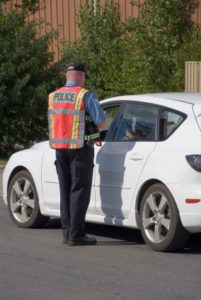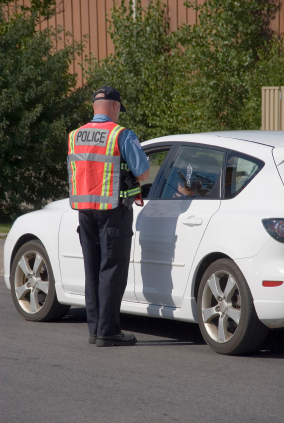We have all seen roadblocks/checkpoints in our driving history or on television. You may have even had to go through one. You do not lose your Constitutional protections when you leave the safety of your home, though they are somewhat narrowed. The law has upheld the constitutionality of many DUI Roadblocks, so long as they are a minimal intrusion to drivers. The courts have ruled that public safety slightly outweighs the inconvenience to drivers; however, if the roadblock is arbitrary or oppressive, then it may be invalid.

DUI Lawyer in Hall County, Georgia explains that one important requirement of a roadblock is that they must be pre-planned in advance and authorized.
The Fourth Amendment of the Constitution protects against unreasonable seizures and searches, and Georgia case law has authorized certain types of roadside checkpoints as reasonable, while others are considered unreasonable and in violation of the Constitution. A police department’s roadblock program searching for general criminal activity is one of those unreasonable types of roadblock seizures.
In 2013, two Georgia Supreme Court cases (Williams v. The State, S13G0178 and Brown v. The State, S12G1287, both decided on October 21, 2013) brought the policies and procedures for police roadblocks into question.
The Williams case:
There are Constitutional limits on the search-and-seizure powers of the police to prevent arbitrary and oppressive intrusions on drivers. One limitation is the prohibition of roadblocks primarily for general crime control. The Georgia Supreme Court case of Williams v. The State arose from an incident in Bibb County (Macon, Georgia), where officers set up a roadblock to search for general criminal activity. Because of the overly broad purpose of the roadblock, the court ruled that the police officers violated the Fourth Amendment right against unlawful seizures and searches. Consequently, the defendant at the center of the Williams case is having the charges dismissed against him.
The Brown case:
In the Georgia Supreme Court case of Brown v. The State, the defendant was charged with driving under the influence and other crimes after he was stopped and later arrested at a roadblock in Cobb County.
The issue examined in this case was the timeliness of the roadblock preparation/decision. Georgia law requires that the decision to set up a roadblock must be made by a supervisor in advance and not by officers while in the field. In this case, the court held that the officer who may have been a qualified supervisor decided to implement the roadblock while acting as an officer in the field and that no evidence was presented that it was planned in advance to occur at a specific time. Therefore, the roadblock at which the defendant was stopped violated the Fourth Amendment.
Regarding Roadblocks Generally:
Police departments should have (and almost all do) standard procedures and rules for preparing for and administering roadblocks.  Police agencies have to take measures to uphold the Constitutional protections that are afforded to drivers on the roads. But there is still debate over the minimal constitutional protections that Georgia law requires for police officers setting up roadblocks and conducting seizures of vehicles. Since this is a developing area of law, these new Georgia Supreme Court decisions (Williams v. The State and Brown v. The State) are very important for anyone who is stopped at a roadblock for a general criminal activity search, or for any other unreasonable purpose.
There are two main concerns over the reasonableness of a roadblock: (1) was the decision made by a supervisor; and (2) was the primary purpose of the police roadblock program legitimate. Other than that, the Georgia courts are instructed to look at the totality of the circumstances of the roadblock to decide whether it was conducted in a reasonable manner, for a legitimate purpose, and in line with the Constitutional requirements of the Fourth Amendment.
The first requirement is that the roadblocks must be preplanned in advance and authorized by a supervisor and NOT by policemen in the field by a spur-of-the-moment decision. (That was the main issue discussed in Brown v. The State.)  Also, there probably should be documentation of the roadblock and, perhaps most important, is that the purpose of the police department’s roadblock program must be legitimate. The focus is on why the police agency uses the checkpoints. The checkpoint policy cannot be for general crime controlÂâ€to allow this would be too much of an invasion on the general population’s privacy without violating the Fourth Amendment.
Georgia case law has had varied guidelines as to what is considered a legitimate and reasonable purpose for a checkpoint. For example, Georgia DUI checkpoints have been held to be constitutional, as long as they are properly conducted and police do not unreasonable seize drivers (meaning the roadblock stop must be a minimal intrusionâ€a brief detention). Also, roadblocks aimed at finding any witnesses to a crime or leads about a crime committed in the area are permitted. However, drug detection checkpoints are not valid. The recent decisions from the Georgia Supreme Court provide further guidance to police departments that checkpoints for general crime-fighting purposes are unconstitutional, as are those checkpoints which are not decided in advance by a supervisor.
In a Georgia DUI Roadblock, some other factors that will be considered are as follows: (1) whether all vehicles were stopped, as opposed to random vehicles stopped; (2) whether the delay to motorists was minimal; (3) whether the roadblock was well-identified as a police checkpoint; and (4) whether the screening police officer had the training and experience to qualify him to make the determination as to which motorists should be further investigated. If you believe any of these factors were handled questionably by the police officers conducting your checkpoint stop, then you may want to discuss your case with a Georgia DUI Lawyer.
The above considerations are the minimal standards to satisfy a particular checkpoint as reasonable. However, the Fourth Amendment’s protections are much broader and may afford drivers further protection. For this reason, it is important to contact a Georgia DUI Attorney to review the specific facts and circumstances of your case.
If you have concern over a roadblock, then you may want to consult with a Georgia DUI Lawyer to consider your options.  Anne Bishop is well-informed on the police policies regarding roadside checkpoints and can try to see if there is anything that can be challenged.
Georgia Criminal Defense Attorney, Anne Bishop, welcomes questions on Criminal Defense and Georgia DUI laws. Please Call or Email us about any questions you may have about GA DUI laws in Georgia and please remember your initial consultation is free of charge.
At A. Bishop Law, our Georgia Criminal Defense Attorney welcomes questions on Criminal Defense laws, Traffic Laws and Georgia DUI laws. Please Call or Email us with any questions.
About the attorney:  Anne Bishop is a Georgia Lawyer with A. Bishop Law in Gainesville, Georgia and handles various DUI / DWI, Marijuana Arrests and other Georgia Criminal Defense matters.  The law office of A. Bishop Law can assist clients throughout Georgia including: Hall County (Gainesville, Oakwood, Flowery Branch), Jackson County  (Jefferson, Braselton) White County (Helen, Cleveland), Lumpkin County (Dahlonega), Dawson County (Dawsonville), Habersham County (Demorest, Cornelia), and all of Northeast Georgia.
This article and/or video should not be considered nor relied upon as legal advice since it is only intended for general overview and informational purposes. Please consult with an attorney on your specific situation in order to determine an appropriate legal course of action.




